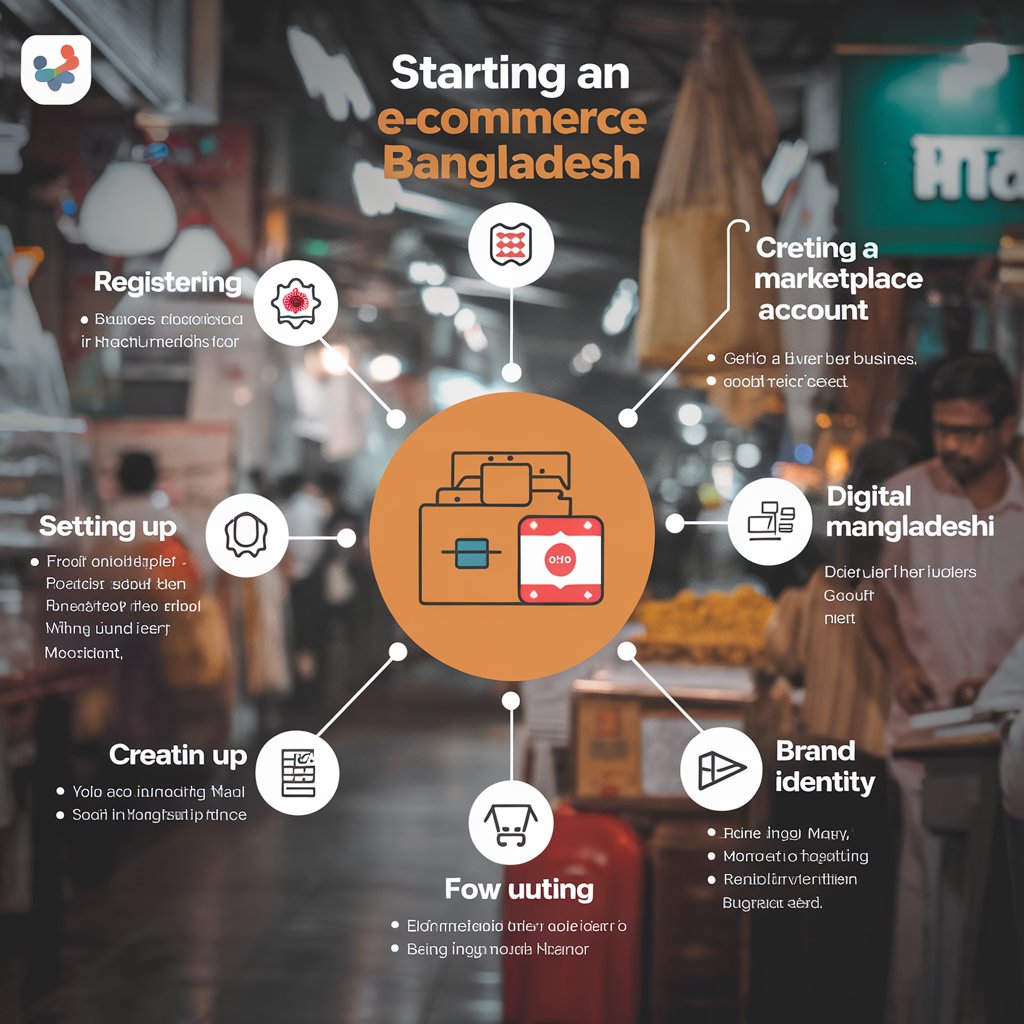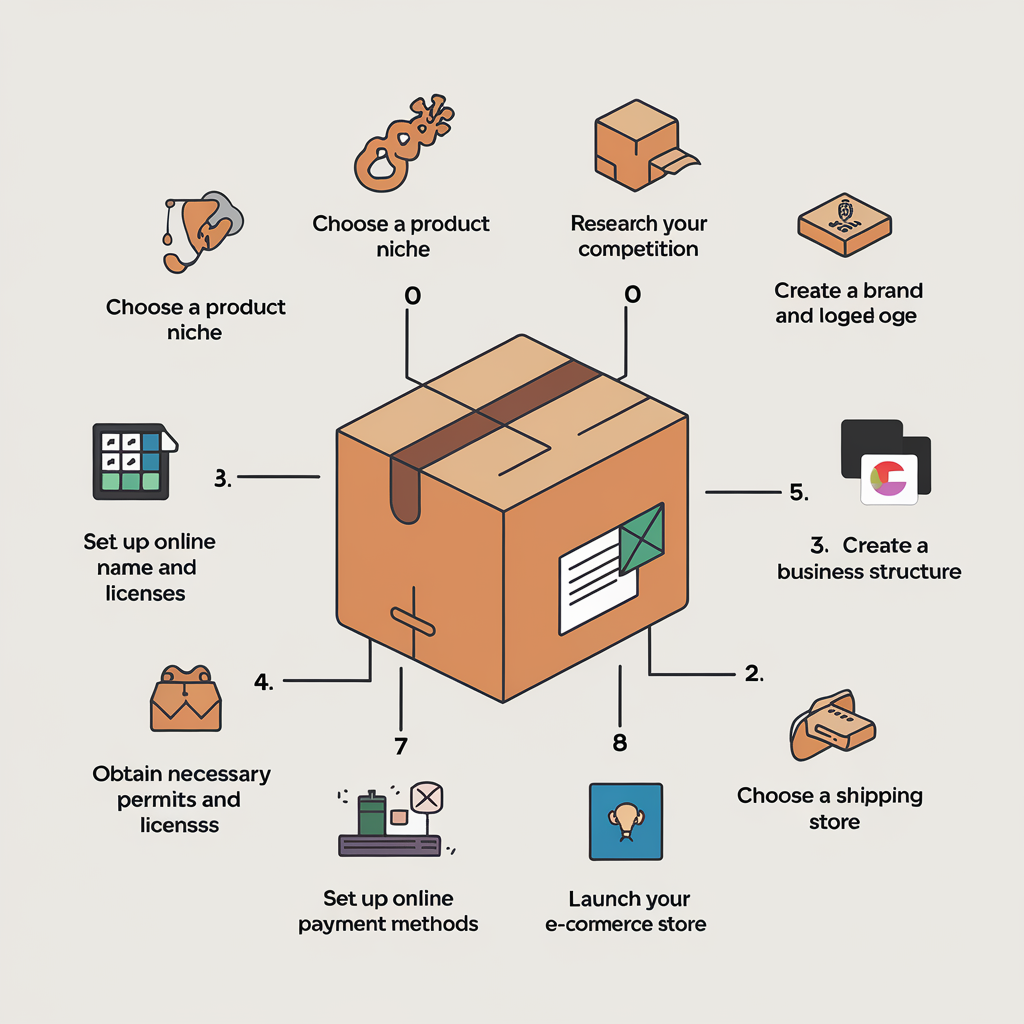The e-commerce landscape in Bangladesh is booming. Rapid digitalization and increased internet penetration have fueled this growth.
Yet, starting an e-commerce business in Bangladesh can seem daunting. There are legal requirements, market considerations, and operational challenges to navigate.

This guide aims to simplify that process. It provides a step-by-step roadmap to launching your online shopping platform in Bangladesh.
From understanding the e-commerce policy to selecting the right payment gateway, we’ve got you covered. We’ll also delve into digital marketing strategies and customer service best practices.
So, whether you’re an aspiring entrepreneur or an existing business owner, this guide is for you. Let’s embark on this exciting journey of starting an e-commerce business in Bangladesh.
Understanding the E-Commerce Landscape in Bangladesh
E-commerce in Bangladesh is on a rapid rise. Internet and mobile phone usage are increasing significantly. This growth provides a fertile ground for online businesses.
Government initiatives are also boosting this sector. Policies aim to support digitalization and enhance online shopping experiences. This creates a favorable environment for entrepreneurs.
To succeed, it’s essential to understand the current landscape. Key factors include local consumer behavior, payment habits, and logistics infrastructure. Knowing these will help tailor your strategy effectively.
Consider these crucial points:
- Market Growth: Analyze e-commerce market trends.
- Consumer Demographics: Understand who your customers are.
- Mobile Influence: Recognize the power of mobile commerce.
By exploring these elements, you can better position your business. This understanding helps make informed decisions, minimizing risks and optimizing opportunities. Consider the nuances of local regulations and consumer preferences. Tailoring your approach to the Bangladeshi context is key to success.

Legal and Regulatory Framework
Starting an e-commerce business in Bangladesh involves navigating a specific legal framework. Understanding the required regulations is crucial. This ensures legal compliance and smooth business operations.
First, acquire the necessary registrations and licenses. A trade license is mandatory for all businesses. Additionally, you must complete VAT registration for tax purposes.
Familiarize yourself with the country’s e-commerce policy. This policy outlines the rights and responsibilities of online businesses. It’s essential for maintaining compliance and avoiding potential penalties.
Important legal considerations include:
- Trade License: Obtain from the local city corporation.
- VAT Registration: File with the National Board of Revenue.
- E-Commerce Policy Compliance: Understand guidelines set by the Ministry of Commerce.
Apart from these, prioritize data protection. Ensure customer data privacy and security are maintained. This is not only a legal requirement but also crucial for customer trust.
By addressing these legal aspects early, you can focus on building your business. This minimizes disruptions that may arise from non-compliance. Remember, legal diligence is foundational to long-term success.
Crafting Your E-Commerce Business Plan
A well-researched business plan is the backbone of any successful venture. It defines your goals and strategies to achieve them. Spend time crafting a comprehensive plan to guide your e-commerce journey.
Start by outlining your business objectives. Determine what you want to accomplish in the first year. Set both short-term and long-term goals for a clear direction.
Next, identify your unique selling proposition (USP). What makes your business stand out from competitors? This could be pricing, quality, or exceptional service. Define this clearly in your plan.
Additionally, develop a financial plan to estimate costs and projections. Calculate your initial investment needs. Include budgets for marketing, operations, and potential risks. Being financially prepared will help you anticipate challenges and opportunities effectively.
A complete business plan provides a roadmap. It keeps you aligned with your vision. As your e-commerce business grows, revisit and adjust the plan to stay competitive in the evolving market.
Identifying Your Target Market and Product Selection
Understanding your target market is crucial to your business’s success. Start by researching the demographics and preferences of potential customers in Bangladesh. Identify what they are looking for in online shopping experiences.
You should analyze market trends and competition. This helps in finding gaps where your business can thrive. Define your target audience based on age, gender, location, and spending habits. This informs your marketing strategies and product offerings.
Choosing the right products or services to sell is equally important. Conduct thorough research on current consumer demands. Evaluate different niches before finalizing your product range. Make sure there is a demand for your selected items and that you can compete on quality and price. A deep understanding of your market and products will set the foundation for a successful e-commerce venture. Stay informed and adaptable to shifts in consumer interest and market dynamics.
Setting Up Your E-Commerce Website
Creating a user-friendly e-commerce website is crucial for online success. This is your virtual storefront, and it should offer a seamless shopping experience. Start by selecting an appropriate platform that suits your business needs.
Focus on user experience and mobile optimization. Many shoppers in Bangladesh use smartphones for online shopping. Ensure your website loads quickly and is easy to navigate. A mobile-responsive design is a must-have feature.
Security is paramount when handling customer data. Obtain an SSL certificate to encrypt transactions and protect sensitive information. Secure payment gateways help build trust with your customers.
To set up your website, consider the following steps:
- Select a Web Hosting Service: Choose a reliable host to guarantee uptime.
- Design Your Website Layout: Opt for a clean, intuitive design.
- Integrate a Payment Gateway: Ensure it supports multiple payment methods.
- Add Product Categories: Organize products for easy access.
- Create a Secure Checkout Process: Simplify the steps to complete a purchase.
Invest time in high-quality product images and descriptions. These elements help customers make informed purchasing decisions. Regularly update your website with new products and features to keep it fresh. A well-crafted e-commerce website is your key to success in Bangladesh’s competitive online shopping landscape.
Payment Gateway Integration and Security
Payment gateways are crucial for processing transactions on your e-commerce platform. They serve as intermediaries between your website and financial institutions. Selecting a reliable payment gateway in Bangladesh is vital for efficient operations.
There are several local and international payment gateway options. Consider factors like transaction fees, support for multiple currencies, and ease of integration. Security should be a top priority to protect customer data and build trust.
When integrating a payment gateway, ensure it supports secure and diverse payment methods. Customers appreciate having options, such as credit cards, debit cards, and mobile wallets. Maintain transparency about accepted payment options on your website.
Key considerations when choosing a payment gateway:
- Transaction Fees: Assess the cost-effectiveness of each gateway.
- Security Features: Opt for gateways with robust encryption protocols.
- Customer Support: Ensure 24/7 assistance is available.
- Currency Support: Verify local and international currency compatibility.
- Ease of Integration: Choose one that integrates smoothly with your platform.
By focusing on a safe and convenient payment process, you enhance customer confidence and encourage repeat business.

Logistics and Order Fulfillment
Efficient logistics are vital for any e-commerce business. Timely and accurate order fulfillment can set you apart. In Bangladesh, strong logistics management can greatly enhance customer satisfaction and loyalty.
Start by selecting reliable courier partners. They should offer prompt delivery services and competitive pricing. Partnering with local and international courier services broadens your reach. Consider services that provide delivery tracking for better customer experience.
Inventory management is another key aspect. Ensure that your stock levels align with customer demand. This approach minimizes the risk of stockouts and overstocking. Using inventory management software can streamline this process, making it easier to track inventory changes.
An effective returns policy also contributes to customer trust. Clearly communicate your return and refund policies. Make the return process hassle-free and swift. This effort can boost customer confidence and enhance your brand’s reputation.
Marketing Your E-Commerce Business
Marketing plays a crucial role in driving an e-commerce business to success. Establishing a robust digital presence is key. An effective digital marketing strategy can significantly increase your brand’s visibility and customer engagement.
Start with SEO to enhance your website’s search engine rankings. This can drive organic traffic to your online store. Additionally, leverage social media platforms like Facebook and Instagram for marketing. These platforms help to engage directly with your target audience.
Consider employing a mix of marketing strategies:
- Social Media Marketing: Regular posts, stories, and ads.
- Content Marketing: Blogs, videos, and infographics.
- Email Marketing: Newsletters and promotional offers.
- Influencer Partnerships: Collaborate with local influencers.
Promotional discounts and seasonal sales can attract new customers. These initiatives can entice them to make a purchase. Always monitor your marketing campaigns’ effectiveness. Use insights to refine and improve your strategies continuously.
Customer Service and Retention Strategies
Exceptional customer service is vital in an e-commerce business. Customers expect timely and helpful responses. Efficient communication can transform one-time buyers into loyal patrons. Ensure your customer support is accessible through various channels like chat, email, and phone. This ensures customers can reach you easily when they need assistance.
Building a strong relationship with your customers is key to retention. Implement loyalty programs and personalized offers to show appreciation. Encourage feedback and reviews to understand their needs better. Tailor your services and products based on customer insights. This approach enhances customer satisfaction and fosters long-term loyalty to your brand.
Monitoring, Analytics, and Continuous Improvement
Regularly monitoring your e-commerce platform is crucial for sustained success. Use analytics tools to track website performance and customer behavior. These insights help you understand which parts of your site are effective and which need improvement.
Continuous improvement is necessary in a competitive market. Analyze data to identify trends and customer preferences. Adapt your strategies based on findings to enhance user experience and increase conversion rates. By doing so, you ensure your business remains relevant and effective in meeting customer demands.
Conclusion: Launching Your E-Commerce Venture
Starting an e-commerce business in Bangladesh presents exciting opportunities. With a solid foundation and strategic planning, your online venture can thrive. Understanding market trends and being adaptable is key.
By following the steps in this guide, you are well-prepared. Focus on delivering quality products and exceptional service. Stay informed and agile, as the e-commerce landscape is ever-evolving. With dedication and the right strategies, your e-commerce business can achieve sustained growth and success in the Bangladeshi market.

 Sony Bravia
Sony Bravia Samsung
Samsung LG Television
LG Television Hamim
Hamim Xiaomi Television
Xiaomi Television Haier
Haier Hisense
Hisense JVCO
JVCO Gree
Gree General
General Hisense AC
Hisense AC Midea AC
Midea AC Viomi AC
Viomi AC![Walton Air Conditioner WSI-INVERNA (SUPERSAVER)-12F [PLASMA]](https://orient-electronics.com/wp-content/uploads/2024/04/channels4_profile-150x150.jpg) Walton
Walton Canon
Canon Sony Camera
Sony Camera Fujifilm
Fujifilm Lowepro
Lowepro Nikon
Nikon USE Camera Lens
USE Camera Lens Danaaz
Danaaz Samsung Refrigerator
Samsung Refrigerator Hitachi
Hitachi Samsung
Samsung Sony
Sony Electronic Gadgets
Electronic Gadgets Kettles
Kettles Fan
Fan D-Link
D-Link